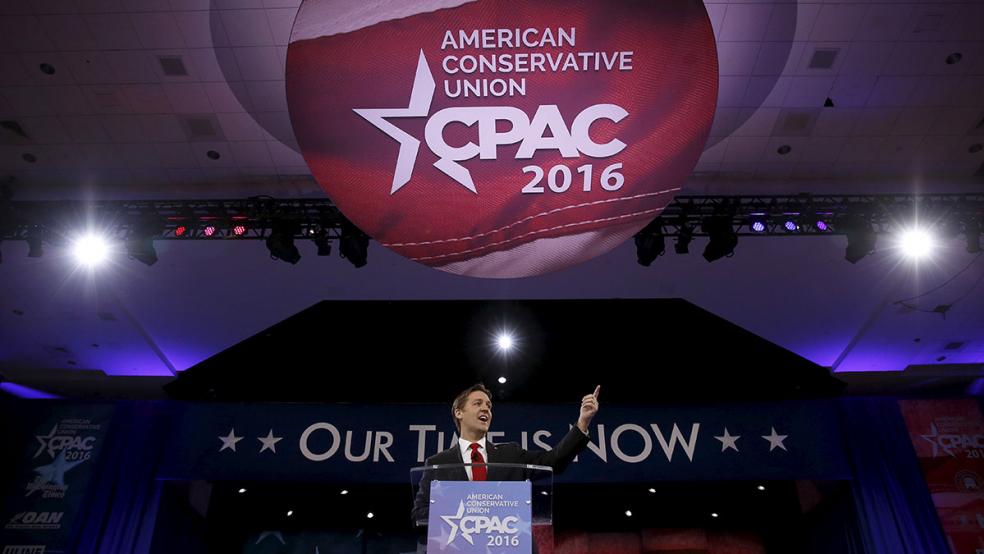It’s been a heady couple of years for the Conservative Political Action Conference, or CPAC, which kicks off this afternoon outside of Washington, D.C. The extended campaign for the 2016 Republican presidential nomination and its vast field of candidates has for two years guaranteed that the agenda at the annual gathering was packed with GOP luminaries, many of whom had their sights set on the Oval Office.
This year, though, the most attention any of the invited speakers are receiving is the coverage being lavished on Milo Yiannopoulos, the disgraced former technology editor of the Breitbart website who doubled as a race and gender-baiting provocateur for the alt-right. After a year-old video of Yiannopoulos appearing to advocate sexual relationships between young teenage boys and older men, CPAC’s leadership hastily withdrew his invitation, followed by Simon & Schuster canceling a book deal.
Related: Trump Scores a Bipartisan Win With His Pick for National Security Adviser
The exclusion of Yiannopoulos will make what was already a pretty thin lineup of speakers even more so. CPAC 2017 will have its share of headliners, mainly from the Trump administration. President Trump himself will make an appearance on Friday afternoon, and Vice President Pence will appear at a 7:30 p.m. session Thursday night.
Several of the president’s top advisers will make an appearance, including White House Counselor Kellyanne Conway, Chief of Staff Reince Priebus and Chief Strategist Steve Bannon. The latter two will be on stage simultaneously, apparently in an effort to knock down persistent rumors that they are not getting along in a White House that has multiple competing power centers.
Education Secretary Betsy DeVos will also sit for a live interview with a friendly host.
But while the top ranks of the White House will be represented, the same cannot be said for the Congress. According to an agenda released Tuesday night, no members of leadership from either the House or Senate will appear at the event.
In fact, the only sitting senator scheduled to show up is ultra-conservative Ted Cruz, of Texas.
Related: In the Age of Trump, Who Can US Allies Believe?
Pickings are slim on the House side as well. Rep. Kevin Brady, Chairman of the House Ways and Means Committee, will be the most influential House member in attendance. A half-dozen lesser lights from the chamber will also appear, mostly as panelists in guided discussions.
While the lineup of speakers may lack the punch of years past, it will be interesting to see what the conference’s general attitude toward Trump is now that he is both the president and the de facto leader of the Republican Party.
By the time CPAC began in 2016, Trump was already leading the Republican primary and people were beginning to take seriously the possibility that he might win. Not all of them were happy about it.
Last year, conservative darling Sen. Ben Sasse of Nebraska, an early and consistent Trump critic, delivered a speech that served as a barely concealed plea not to vote for the billionaire former reality television star. It also coincided with a controversial speech delivered by former Republican presidential nominee Mitt Romney, in which he called then-candidate Trump “a phony and a fraud.”
Related: How John McCain Became The Face of GOP Resistance to Trump
At the time, many CPAC attendees were seemingly conflicted about Trump but were livid at the possibility that establishment Republicans like Romney might drive him away with his many followers in tow.
Ron Nervitt, a retired federal employee from Williamsburg, VA said, “I’m not a Trump supporter but I think what the Republicans are doing in trying to scuttle him is terrible.”
“If Trump wins, it’s ‘Oh, my God,’’ he said. “But if Trump gets scuttled? ‘Oh, my God. Oh, my God.’ Because I don’t see any of the Trump supporters voting this year if they really do something like that.”
Karl Nilson of Bowie, Maryland, who was walking around last year’s CPAC conference in a shirt with a “Stop Trump” sign on it, said, “In the end, if he gets the most votes, gets the most delegates, he should get the nomination. I’m not going to vote for him. But I think it would be a disaster if he does win the nomination and is denied it somehow.”
As the conference was going on, and amid rumors of a planned walkout during his speech, Trump canceled his scheduled appearance there at the last minute, citing campaign commitments in the Midwest.
“Because of this, he will not be able to speak at CPAC as he has done for many consecutive years,” the campaign said in a statement that now looks oddly prescient. “Mr. Trump would like to thank Matt Schlapp and all of the executives at CPAC and looks forward to returning to next year, hopefully as president of the United States.”





